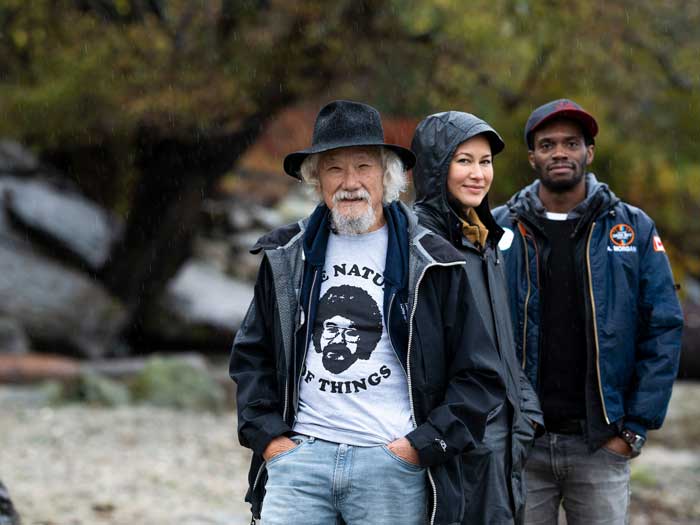 It was when he got a job at the Ontario Science Centre as a “Host” that Anthony Morgan really fell in love with science (Photograph courtesy of CBC)
It was when he got a job at the Ontario Science Centre as a “Host” that Anthony Morgan really fell in love with science (Photograph courtesy of CBC)
When Anthony Morgan was in high school, he didn’t particularly like science.
Morgan, who is currently pursuing a PhD in molecular science at Toronto Metropolitan University, always knew he was good at the subject. But it wasn’t until he got a job at the Ontario Science Centre as a “Host”—the person who walks around in a white lab coat “mic-dropping” science information and conducting cool, interactive experiments—that he really fell in love with it.
“I started to realize if you understand the world around you, you can do incredible things,” he says. “It was like getting a superpower.”
Morgan has spent the time since developing his signature approach to science: informal, fun and always educational, including public and often large-scale science demonstrations—like the time he vacuum-sealed himself to a building in downtown Toronto.
His love for talking about science—and having fun while doing it—has put Morgan in the host seat of several science programs for the CBC, the Discovery Channel and more.
And as he prepares to take over as the new co-host (along with Sarika Cullis-Suzuki) of the celebrated CBC landmark show The Nature of Things, he says he’ll be bringing that style, as well as some wise words he got from the show’s former host, legendary scientist David Suzuki.
What do you think is missing from the way that we’re thinking and talking about science?
I think that most people assume science is the shape of a benzene ring or memorizing exactly what chlorophyll does, so they think it’s really boring, and they say it’s really hard. To me, science is a process that we engage in when we have questions about the world that we don’t know the answer to. It’s something that literally anybody can do for any problem they have in their lives. It’s just how you think about solving that problem.
How do you like to approach conversations about science and science education?
I like to do informal stuff. I don’t want people to feel like they’re at a lecture when I’m talking to them about science. For me, we are peers exploring, I am not a professor explaining. So, we find some weird problem that we didn’t even know we wanted to know the answer to, and then we collaboratively come up with: “How do we know? What things can we do to test our ideas? What things are we likely to be wrong about? And how can we figure out where the blind spots in our thinking are?” I always think of Calvin and Hobbes going on an adventure, learning about the world around us.
Why is it important to make science education interactive and accessible, even for adults?
Especially for adults. We just came through a pandemic where we all had a really hard time agreeing about what the best way forward was. And as far as I can tell, science is the best way of thinking we’ve ever come up with in history for solving really big complicated problems. But it’s not the only tool we need. Because if we can’t cooperate, if we can’t get along and agree about the strategies we want to adopt, then all the science in the world doesn’t do us any good. We have to make sure everybody’s on the same page about what things are true, what things are not, and how we would know.
Tell me about how you’re going to approach your new role as co-host of The Nature of Things.
The main thing I want to try to bring to the show is that sense of playful curiosity, and that there’s no such thing as a dumb question. It’s all about asking some of the weirdest questions at the intersection of science and society, things that affect people’s daily lives. And there’s no topic too silly or profound or taboo that we won’t ask, and we get to apply the tool of science to thinking about the weirdest and most fun ideas we possibly can find. To me, there’s nothing more fun in the world than exploring big, weird, crazy ideas with lots of strangers.
What are you most excited about as you take on this new role?
God, I mean, my job is to be professionally curious the way that kids are. I am basically a six-year-old who has never had to grow up. I can travel around the world asking the smartest people in the world: “Why? How does that work? How come?” I could not be happier.
And you’re also filling some pretty big shoes as you take over from the show’s former host David Suzuki. Did he offer you any words of wisdom when you got the job?
He gave me really good advice. He said, “Don’t try to be me, because you’re not. You should just be you. They hired you because there’s something special about you in the way that you approach science and the way that you engage with the public. So just be yourself. Let yourself be curious the way that you already are.” I took that to heart, and it’s exactly what I’m going to try to do.
Delve into sustainability
Check out CPA Canada’s extensive sustainability resources.
